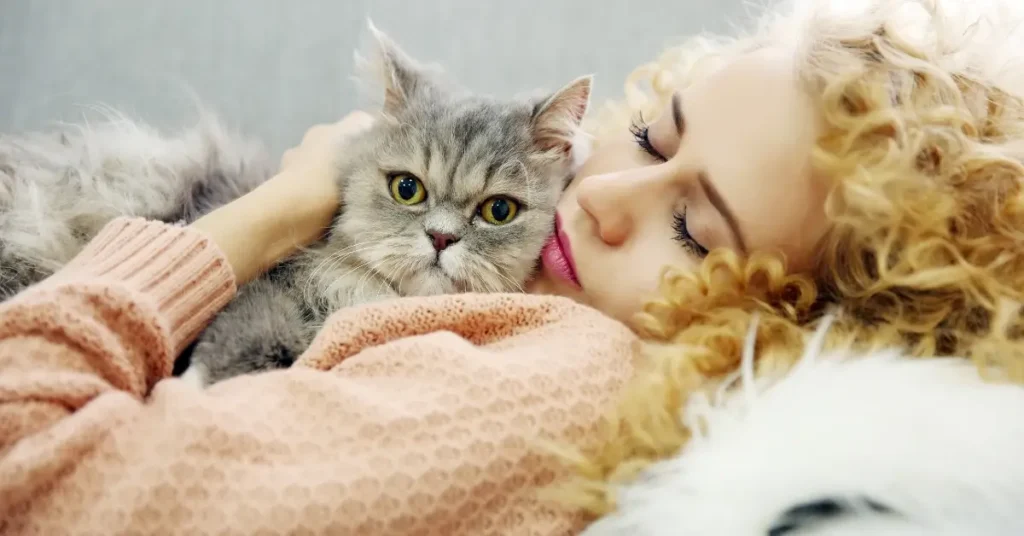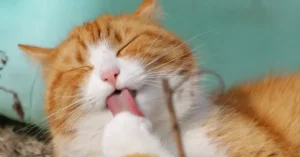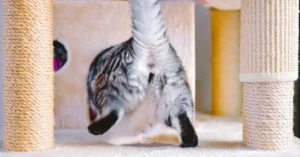Are cats good for mental health? This question is more than just a curiosity for cat lovers. It’s a topic gaining traction in mental wellness circles.
Cats, with their soothing purrs and affectionate nuzzling, aren’t just cute companions; they might be key players in improving our mental well-being.
From their calming presence to their knack for unconditional love, cats offer more than just companionship. They provide a unique form of comfort and stress relief that’s both subtle and powerful.
In this discussion, we’ll explore how these furry friends can positively impact our mental health, backed by scientific insights and heartwarming stories.
Whether you’re a dedicated cat owner or simply a cat enthusiast, understanding the mental health benefits of having a cat will add another layer of appreciation for these charming creatures
The Science of Companionship
We’ve often asked ourselves, are cats good for mental health? Let’s dive into the science behind this question, exploring the companionship they offer and how it stacks up against their canine counterparts. We’ll also look at the latest research findings in this intriguing arena of mental well-being.
Comparing Cats to Dogs
Cats and dogs are both prevalent pets, offering unparalleled companionship, but they interact quite differently with their human friends. Dogs may provide a more overt companionship, often involving outdoor activities that can increase our exercise levels and, subsequently, our endorphin production.
Cats, on the other hand, offer a more subdued form of companionship, marked by calm presence and quiet interaction. This can be especially beneficial during times of stress or anxiety, as interacting with a cat may lead to a reduction in the stress hormone cortisol and an increase in oxytocin, the hormone linked to bonding and affection.
Cats and Mental Health Research
When it comes to mental health, research has highlighted several ways in which cats may be beneficial. Scientific studies have shown that having a cat can lead to increased levels of the feel-good hormones like serotonin and dopamine, which can help us feel more positive and relaxed.
Moreover, the purring of a cat has been known to calm nerves and lower stress, acting as a natural therapeutic measure. According to Psych Central, the presence of cats can bolster our overall mental health by making us feel loved and needed.
Furthermore, research published on NCBI suggests that companion animals, including cats, can play a critical role in managing mental health conditions, especially in times of crisis, by providing constant, non-judgmental support.

Positive Emotional Effects
Exploring whether are cats good for mental health unveils a tapestry of benefits, particularly for our emotions and sense of connection.
Effects on Mood and Emotions
Cats have a remarkable ability to elevate our mood. A comforting purr or a playful moment can instantaneously bring joy, infusing a positive impact on our day-to-day emotions. Clinical findings support that pets, particularly cats, can contribute to more positive moods and emotional states.
For instance, a study highlighted by Psych Central shows how the companionship of cats can lead to enhancements in mental health, such as reducing negative emotions like stress and anxiety.
Reducing Loneliness and Depression
The presence of a cat in one’s life can be a powerful antidote to feelings of loneliness and depression. As furry companions, cats offer a sense of connection and support that is difficult to replicate.
Their unconditional love serves as a constant in combating loneliness. According to Psychiatry.org, respondents in a survey report that pets aid in reducing stress and feelings of depression by offering unconditional support and reducing the sense of isolation.
Physical Health Perks
We’ve all wondered, are cats good for mental health? But did you know that these furry friends offer incredible physical health benefits too? Let’s dig into some of the specific ways cats can boost our well-being.
Lower Blood Pressure and Improved Heart Health
Research suggests that the mere presence of a cat can lead to lower blood pressure in their owners. One study shared on Medical News Today indicates that interacting with cats can calm us, which in turn may reduce stress and lower blood pressure.
Lower stress levels can also contribute to a decreased heart rate, which is a key factor in maintaining good heart health and reducing the risk of a heart attack.

Stress-Related Health Conditions
Stress can manifest in several health conditions, but here’s the good news: cats might help us fight those conditions off! The consistent pattern of purring from a cat ranges between 25 and 150 Hertz, which is not only soothing but has been linked to helping humans heal bones, tendons, and muscles, as noted in an article from 1MD.
Further, this relaxing effect cats have on us can serve as a buffer against stress-related health conditions, potentially reducing the risk of developing complications related to high blood pressure and other stress-induced health issues.
Cats as Supportive Allies
Exploring whether are cats good for mental health, we find that they serve as exceptional companions. Furry and purring, cats offer more than just cozy snuggles; they play a significant role in our emotional well-being.
Cats as Therapy Animals
Cats have earned their status as therapy animals through their ability to provide comfort and alleviate stress. Scientific research confirms that the act of petting a cat can lead to a decrease in stress-related hormones in humans.
For instance, interaction with cats can significantly reduce symptoms of anxiety, making them valuable allies in mental health therapy. These felines are not just pets; they’re nurturers capable of bringing tranquility to a troubled mind.
Cats in Family and Relationship Support
Within the dynamics of a family or a relationship, cats contribute to a sense of unity and support. The shared love and care for a pet can reinforce bonding between family members.
It’s fascinating to observe how a cat can act as a social facilitator, helping family members to express and share affection. Cats often provide a common ground for conversation and interaction, which is a fundamental aspect of sustaining healthy familial and couple relationships.

Specific Population Benefits
When exploring the question, “are cats good for mental health,” we find compelling benefits in specific groups, particularly among individuals with autism and veterans with PTSD. Let’s dive into these targeted areas of impact.
Assistance with Autism and Other Conditions
Children and adults on the autism spectrum often find a unique sense of companionship with cats. The predictable and quiet nature of cats can be soothing for those with sensory processing challenges.
Research highlights how the presence of a cat can enhance social interaction and provide non-verbal individuals with autism a way to communicate through the pet. Moreover, feline companions can help reduce anxiety and offer a comforting routine in the lives of those with autism.
Fostering Resilience in Veterans and Others with PTSD
For our veterans and others living with PTSD, cats have been a beacon of hope and an anchor of calmness. Studies have underscored the role of pets in bolstering resilience, particularly for those facing the daily struggles of post-traumatic stress disorder (PTSD).
A cat’s undemanding companionship and the act of petting can lower stress levels, leading to a state of relaxation and potentially better sleep patterns. Beyond the emotional benefits, engaging with cats has been shown to reduce flashbacks and catastrophizing thoughts, making them valuable allies in the journey to recovery for veterans.
Lifestyle and Behavioral Impact
Are cats good for mental health? We’re excited to explore how our feline friends can positively influence our daily lives and behaviors.
Daily Routines and Exercise
Cats encourage us to maintain a consistent daily routine. Feeding, grooming, and playing with our cats sets a structure to our day, which can increase our sense of stability and well-being.
Not to mention, interactive play involves us in light exercise, such as tossing a ball or wielding a cat wand, which keeps both us and our cats physically active. This can help reduce feelings of social isolation by creating a shared activity and it promotes the time outdoors for cats that have outdoor access.
- Morning: Feed and groom, creating a sense of responsibility.
- Evening: Dedicated playtime, which can also involve light exercise for us.

Socialization and Interaction
Cats can certainly enhance our social interaction. Sharing experiences and moments with a pet can lead to conversations with other pet lovers, fostering social connections.
Cats also provide nonjudgmental companionship that can be particularly soothing for those who face social anxiety or isolation. Their presence can make us feel needed and help develop a nurturing disposition.
- Companionship: Eases loneliness, offering unconditional emotional support.
- Social Catalyst: Owning a cat can be a conversation starter among fellow pet enthusiasts.
By integrating cats into our lifestyle, we not only enhance their lives but also enrich our own with a mix of structured routines and heartfelt interactions.
Understanding the Risks and Responsibilities
When we explore whether are cats good for mental health, it’s crucial that we balance the conversation by acknowledging potential risks and the seriousness of responsible pet ownership.
Health Risks from Cats
Cats can carry a parasite known as Toxoplasma gondii, which, if transmitted to humans, can lead to health issues. Studies have examined the correlation between this parasite and various mental health outcomes, such as an increased risk of suicide.
Although the findings suggest a potential link, being a cat owner does not automatically put you at high risk for such outcomes. Simple measures like regular hand-washing and keeping the cat’s living area clean can significantly mitigate these risks.
- Preventive measures include:
- Regular veterinary checks for your cat.
- Proper hygiene practices after handling litter.
The Importance of Responsible Cat Ownership
Responsible cat ownership is vital not just for our mental health, but for the wellbeing of our feline friends, too. Recognizing the responsibilities that come with pet ownership is essential.
- Key responsibilities:
- Providing regular, balanced meals.
- Ensuring a safe, stimulating environment.
- Budgeting for potential health care costs.
By understanding the full spectrum of pet ownership, including these responsibilities and potential health risks, we can foster a safe and beneficial relationship with our pets, further enriching our lives and potentially enhancing our mental health.

Influence of Cat Content
As we explore whether cats are good for mental health, it’s fascinating to look at how cat content, from adorable videos to social media trends, can positively impact our mood and well-being.
The Phenomenon of Cat Videos
It’s undeniable: cat videos have taken the internet by storm. These whiskered wonders have become a viral sensation, appealing to a broad audience across the globe.
Studies suggest that watching these furry friends can elevate levels of positive emotions, decrease negative feelings, and even lead to a boost in energy. Hashtags like #paws4mentalhealth reflect a growing awareness of the link between cat content and mental health.
Future Directions in Cat-Related Research
We’ve seen growing interest in exploring whether cats are good for mental health, sparking a wealth of preliminary studies. But where do we go from here?
Identifying Gaps in Current Studies
First, it’s crucial to pinpoint areas where data is scant or inconclusive. Many existing studies rely on self-reported measures of mental health, which can be subjective. Our next steps must include developing more objective, standardized methods for assessing the mental health benefits of cat ownership. This will allow us to obtain more reliable and generalizable results.
Expanding the Scientific Evidence
In expanding the evidence base, longitudinal studies will be key. Tracking individuals over time provides a clearer picture of the long-term impacts of feline companionship on mental wellness. Moreover, by integrating biological measures, such as stress hormones, future research can validate the emotional advantages of owning cats with factual scientific evidence, solidifying what many cat owners already believe.

Our thoughts about are cats good for mental health
We’ve always been intrigued by the question, “Are cats good for mental health?” After all, who hasn’t felt a surge of joy when a purring cat cuddles up in their lap? It’s a topic that brings a smile to our faces as we explore the various ways our feline friends could potentially improve our emotional well-being.
- Stress Reduction: The soothing sound of a cat’s purr and the soft texture of their fur can act as a natural stress-reliever. It’s like having a living stress ball by your side.
- Companionship: Cats offer unwavering companionship. For those who may feel lonely, a cat’s presence can make a house feel more like a home.
According to the American Psychiatric Association, a significant number of people have reported that their cats had a favorable influence on their mental health. This isn’t surprising, considering the joy we often feel from our cats’ quirky antics and affection.
On the flip side, responsibilities of pet ownership may introduce stress for some, particularly if one’s mental health is severely compromised. The complex relationship between cats and mental health is nuanced and varies from person to person. Yet, the potential benefits are many, including:
- Mood Improvement: There’s undeniable warmth in the moments shared with a cat. Their playful behavior can bring laughter and lightness to a heavy day.
- Health Benefits: Studies suggest cat owners might have a lower risk of heart disease, possibly due to the calming effects cats can have on us.
In our personal experiences and conversations with other cat owners, we’ve gathered a sense of validation. Cats can and often do play a positive role in the lives of those they touch.
FAQ: Are Cats Good for Mental Health?
We often find ourselves asking, “Are cats good for mental health?” Let’s dig into some common questions to uncover the benefits our feline friends can have on our emotional well-being.
Can owning a cat help with depression?
Evidence suggests that cats can play a role in alleviating symptoms of depression. The simple act of petting a cat has been shown to release feel-good chemicals in the brain, like serotonin and dopamine, which are known mood enhancers.
Companionship: Having a cat provides companionship, which can help reduce feelings of isolation and loneliness, common contributors to depression.
Responsibility & Routine: Caring for a cat creates a sense of purpose and establishes a daily routine, both of which can help manage depression.
Do cats affect your mental health?
Yes, cats do affect mental health, and often in a positive way. Interacting with cats can lead to improvements in several areas of mental health, including self-esteem and physical fitness, which contribute to a higher sense of well-being.
Companionship: Having a cat provides companionship, which can help reduce feelings of isolation and loneliness, common contributors to depression.
Responsibility & Routine: Caring for a cat creates a sense of purpose and establishes a daily routine, both of which can help manage depression.
Are cats good for anxiety?
Cats are known to be quite effective at easing feelings of anxiety. Their presence alone can be soothing, and caring for them can provide a welcome distraction from anxious thoughts.
Purring: A cat’s purr has a calming effect, which can be therapeutic for those suffering from anxiety.
Unconditional Love: The unconditional affection a cat provides can alleviate worries and bolster emotional resilience against anxiety.
If you also would like to know something about “Can cats eat vanilla ice cream?” have a look at our article.
If you are curious about the health benefits of having a cat it would be a pleasure if you read our article.
What are your thoughts about whether are cats good for mental health? Let us know in the comments.





